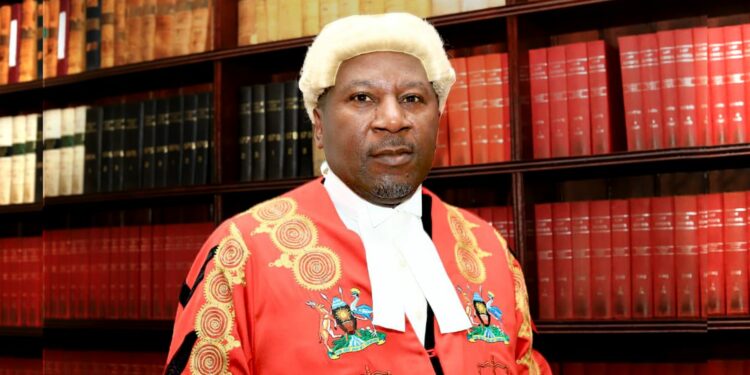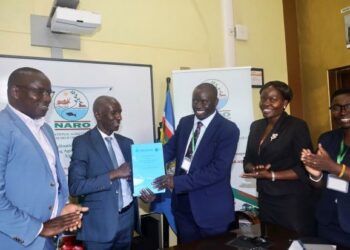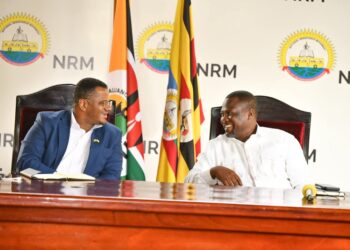The Uganda Law Society (ULS) has officially withdrawn its “Excellence from the Bench” award from Justice Musa Ssekaana, citing multiple instances of judicial misconduct.
This decision, announced in an Executive Order signed by ULS President Isaac Ssemakadde, follows a series of complaints against the judge for abuse of power, bias, and disregard for judicial ethics.
The move comes after the ULS Council, exercising its authority under Section 10 of the Uganda Law Society Act, found Justice Ssekaana responsible for at least 18 documented cases of misconduct. Among the allegations are claims that he used his office to benefit friends and relatives, showed prejudice in his rulings, failed to uphold the law, refused to recuse himself in cases of conflict of interest, and harassed court users and advocates.
“Justice Ssekaana’s conduct has violated the very principles of fairness and impartiality that judges are sworn to uphold,” said Isaac Ssemakadde. “When the scales of justice are tipped by bias or intimidation, the entire system is weakened.”
The ULS Council’s decision directs Justice Ssekaana to return the “Excellence from the Bench” award granted to him in September 2021. “We cannot allow an accolade meant to celebrate judicial integrity to remain with someone who has betrayed that trust,” Ssemakadde asserted. Justice Ssekaana has also been instructed to remove references to the award from his website, curriculum vitae, and any other public platforms where it is listed as an achievement.
Furthermore, the ULS has called for a one-month boycott of Justice Ssekaana by all its members, effective immediately. “We urge every advocate to stand firm in defence of judicial ethics by refraining from appearing before Justice Ssekaana,” the statement reads. The boycott is intended to send a strong message that judicial misconduct will not be tolerated.
The ULS criticized the Principal Judge for failing to take action despite numerous complaints against Justice Ssekaana. “The inaction from the judiciary’s leadership has enabled this misconduct to persist unchecked,” Ssemakadde noted. “Judicial accountability must be more than just a slogan; it must be a practice.”
The Executive Order also calls on the Judicial Service Commission (JSC) to expedite investigations into the complaints against Justice Ssekaana, some of which date back to 2018. The ULS has demanded that the JSC publish their findings by January 15, 2025. “Justice delayed is justice denied,” Ssemakadde remarked, underscoring the urgency of the investigations.
ULS members have also been warned that non-compliance with the boycott will result in disciplinary action. “Any member who disregards this directive will be referred to the ULS Disciplinary Committee for appropriate action,” the order states.
The Uganda Law Society has scheduled a general meeting before January 31, 2025, to review the boycott’s effectiveness and discuss the judiciary’s performance report for 2024. “This is a pivotal moment for the legal community in Uganda,” Ssemakadde said. “We must collectively uphold the principles that ensure justice is served fairly and impartially.”
Meanwhile, the bad blood between the country’s leadership council of Bar members and one of the members of the Bench (Justice Ssekaana) births from his recent ruling in which he issued a temporary and mandatory injunction restraining the Uganda Law Society (ULS) and its council from holding an Extraordinary General Meeting (EGM) scheduled for December 17, 2024.
The applicants in this case argued that the council was improperly constituted following the expulsion of the Attorney General and Solicitor General, both of whom are statutory members of the council. They further contended that the council’s actions to hold EGM violated natural justice and the Uganda Law Society Act, including the issuance of decisions without affording the affected individuals a right to be heard.
Justice Ssekaana noted that the applications raised significant legal questions, including: Whether the ULS council was duly constituted after the expulsion of statutory members. Whether the council’s actions, including the suspension of members and nomination exclusions, were procedurally improper and ultra vires. Whether the planned EGM was intended to validate illegal actions by the council.
In his ruling, Justice Ssekaana expressed concerns over the potential for irreparable harm if the disputed EGM proceeded, noting that the integrity of the ULS elections and council decisions was at stake. “The duty to uphold the law should be sacrosanct for everything done by the Uganda Law Society,” he remarked, emphasizing the need to protect minority rights and prevent the perpetuation of illegalities under the guise of majority rule.
Do you have a story in your community or an opinion to share with us: Email us at editorial@watchdoguganda.com













